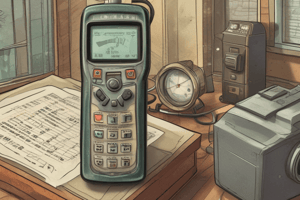Podcast
Questions and Answers
What type of dosimeters based on semiconductor technology are commonly used in patient dosimetry?
What type of dosimeters based on semiconductor technology are commonly used in patient dosimetry?
- Photodiodes
- Photoconductors
- Thermistors
- Silicon diodes (correct)
Why are p-type diodes preferred over n-type diodes in diagnostic radiology dosimeters?
Why are p-type diodes preferred over n-type diodes in diagnostic radiology dosimeters?
- They produce fewer electron-hole pairs
- They have a much smaller dark current (correct)
- They generate more noise
- They are more affected by radiation damage
Why is it essential for MOSFETs to be connected to a bias voltage during irradiation?
Why is it essential for MOSFETs to be connected to a bias voltage during irradiation?
- To eliminate the need for patient dosimetry
- To increase the radiation damage
- To collect the charge liberated by the radiation (correct)
- To reduce the noise level
What is the type of current generated in a silicon diode when radiation falls on it?
What is the type of current generated in a silicon diode when radiation falls on it?
Which dosimeter type is a miniature silicon transistor?
Which dosimeter type is a miniature silicon transistor?
What should be ensured about the leakage (dark) current in semiconductor dosimeters?
What should be ensured about the leakage (dark) current in semiconductor dosimeters?
Why are MOSFETs convenient for use in many applications?
Why are MOSFETs convenient for use in many applications?
Flashcards are hidden until you start studying
Study Notes
Radiation Detection
- Radiation detection can be categorized into three types: gas ionization, solid state, and scintillation.
Types of Detectors
- Gas filled detectors:
- Ionization chambers
- Proportional counters
- Geiger-Mueller (GM) counters
- Solid state detectors:
- Scintillator
- Semiconductor detectors
Geiger-Muller Counter
- Measures radioactive decay by registering the ions and electrons produced as a radioactive particle passes through a gas-filled chamber.
- Creates a detectable electrical pulse that can be counted and measured.
Patient Dosimetry
- Primary responsibility of the medical physicist in diagnostic radiology.
- Radiation measurements are critical for exposure control of workers and the public.
Radiation Fields
- Vary from plain projection geometry, slit geometry, point geometry, and can be stationary or moving, including rotational.
Dose Measurements
- Essential in acceptance testing and quality control.
- Accuracy requirements are less stringent than for radiotherapy.
- Must not interfere with the examination.
Dosimeters
- Instrument that measures the dose of ionizing radiation.
- Comprises a measuring assembly and one or more detector assemblies.
- Can be classified as active or passive.
Active Dosimeters
- Display the dose value directly.
- Include ionization chambers and semiconductor detectors.
Passive Dosimeters
- Record a signal that must be subsequently retrieved and converted to dose (or air kerma) by a reading device.
- Include thermoluminescent (TLD), optically stimulated luminescence (OSL), and film (including radiochromic film).
Properties of Diagnostic Radiology Dosimeters
- Many types of ionization chambers and solid state detectors are commercially available for the measurement of air kerma (and its derivatives).
- Solid state detectors have found wide use in quality control measurements due to their small size, ruggedness, and convenience of use.
Scintillation Detector
- Measures the rate of radioactive decay by sensing flashes of light that the radiation produces in the detector.
Ionization Chambers
- Air-filled chamber with an electric field formed by the application of a polarizing voltage across two electrodes.
- Collect all charges liberated by the ionization of the air contained within the chamber.
- The number of ions collected or the rate of their collection is the recorded signal.
- Specialized chambers come in parallel plate, cylindrical, and spherical shapes.
Application Hints for Ionization Chambers
- Venting is necessary to prevent air pressure changes affecting the reading.
- Automatic temperature and/or pressure corrections should be considered when interpreting the reading.
- The chamber should be at a distance from all supporting devices to avoid backscatter radiation.
- The user should know the limitations and rated ranges for all quantities affecting the measurements.
Studying That Suits You
Use AI to generate personalized quizzes and flashcards to suit your learning preferences.



